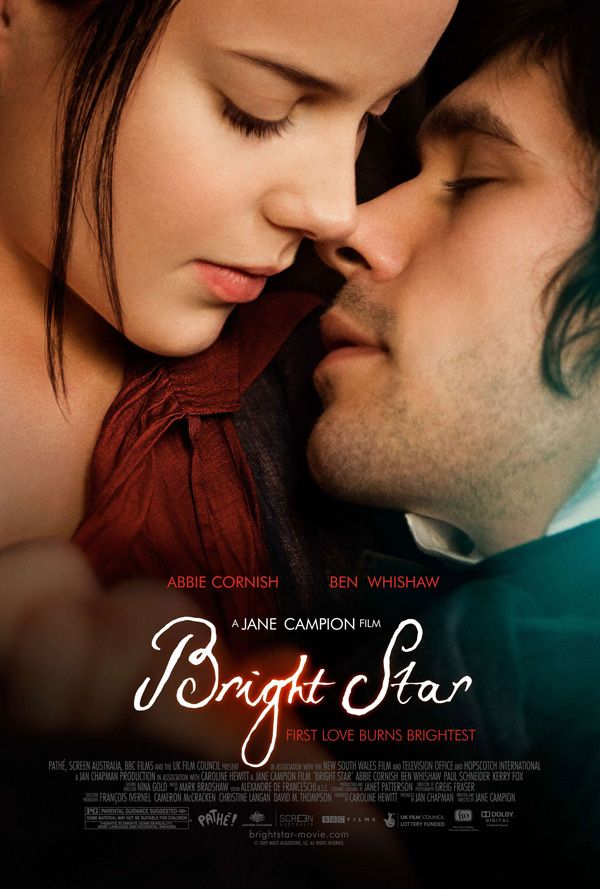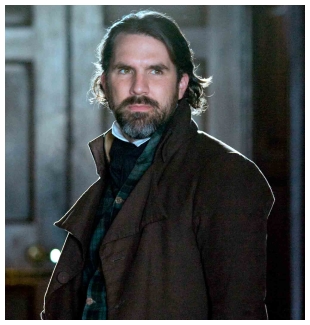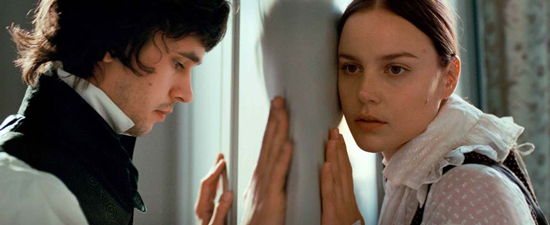

Director: Jane Campion, 2009. (PG)
Light and slight, Bright Star presents a picture of first love, a first love that burns brightest and is steadfast, As the opening lines of John Keats' famous poem of the same name says, "Bright star, would I were stedfast as thou art".
Written, produced and directed by Jane Campion, who won an Oscar for The Piano, her 1993 period piece, Bright Star tells the true story of the three year romance between Fanny Brawne (Abbie Cormish) and the poet John Keats (Ben Whishaw). But it is a doomed romance as any cursory review of Keats' life will attest. He is in debt, a poor artist with no source of income. He has no way to support a wife. Though they come to love one another, finances and ill health ultimately form a chasm too wide to bridge.
Unlike most period pieces, which are sometimes excuses to parade pretty girls in lavish frocks, Campion's film is far more subdued. It feels fresh and faithful to the era. It relies on a sharp and intelligent screenplay with realistic dialog, and good chemistry between the two relatively unknown leads.
 Fanny is literally the girl next-door. Keats lives with his friend Mr. Brown (Paul Schneider, The Assassination of Jesse James), a rude Scotsman who wants to protect Keats from any intrusion that might deter his muse. The opening scene makes this clear. Fanny, a fashionista, is discussing her opinions on fashion in the sitting room while her family and Mr. Brown are having tea. When she wants to take a cup to Keats, Brown will not have it. But Fanny's personality emerges: she is a rule to herself. She will not be disappointed, and delivers some tea to Keats. Not love at first glance, this is a love that simmers slowly until it reaches full bloom, a thing of beauty.
Fanny is literally the girl next-door. Keats lives with his friend Mr. Brown (Paul Schneider, The Assassination of Jesse James), a rude Scotsman who wants to protect Keats from any intrusion that might deter his muse. The opening scene makes this clear. Fanny, a fashionista, is discussing her opinions on fashion in the sitting room while her family and Mr. Brown are having tea. When she wants to take a cup to Keats, Brown will not have it. But Fanny's personality emerges: she is a rule to herself. She will not be disappointed, and delivers some tea to Keats. Not love at first glance, this is a love that simmers slowly until it reaches full bloom, a thing of beauty.When Fanny asks Keats to teach her to understand and appreciate poetry he agrees. A marvelous scene educates her and us. She tells him, "I don't know how to work out a poem." Keats thinks a moment and responds,
A poem needs understanding through the senses. The point of diving into a lake is not immediately to swim to the shore but to be in the lake, to luxuriate in the sensation of water. You do not work the lake out, it is an experience beyond thought. Poetry soothes and emboldens the soul to accept the mystery.
 Bright Star, more than many movies, touches the soul. I must admit that I am a bit of a Philistine when it comes to poetry. I have never really understood it, though I had to learn many of the classic English poems in school. But they did not do much for me. They were mere words on paper, often with seemingly forced rhyme and meter. But Keats' words here touched a nerve deep within me. A poem is deep not superficial. It is not a pithy proverb. Nor is it a rule or law. It is a hidden gem that must be experienced, reveled in even. Its purpose is to move the soul emotionally, not expand the head academically. I tend to focus on the latter and leave the former alone. But that is my loss. I need to be like Fanny, and open myself to the hidden pleasures of poetry.
Bright Star, more than many movies, touches the soul. I must admit that I am a bit of a Philistine when it comes to poetry. I have never really understood it, though I had to learn many of the classic English poems in school. But they did not do much for me. They were mere words on paper, often with seemingly forced rhyme and meter. But Keats' words here touched a nerve deep within me. A poem is deep not superficial. It is not a pithy proverb. Nor is it a rule or law. It is a hidden gem that must be experienced, reveled in even. Its purpose is to move the soul emotionally, not expand the head academically. I tend to focus on the latter and leave the former alone. But that is my loss. I need to be like Fanny, and open myself to the hidden pleasures of poetry.The Bible is filled with poetry. The prophets and wisdom literature include portions of poetry. The Song of Solomon is a lengthy poetic description of a man's love for a woman.The longest book, in terms of chapters, The Psalms, is a collection of poems and songs. Many Christians claim this book as their favorite, since they can come to it time and again to find solace for their soul in times of trouble. Perhaps my lack of understanding of poetry is the reason I find the Psalms less appealing than the epistles or the gospels. As I open my mind to the experience of poems I hope that my love for the Psalms will grow with it.
 Campion uses poetry effectively in the film. Quoting from many of Keats' letters and poems, we gain appreciation for his work."A thing of beauty is a joy forever. Its loveliness increases. It will never pass into nothingness." My favorite comes from a scene where they are lying on the grass looking up at the sky and trees. Keats recites, "I almost wish we were butterflies, and lived but three summer days. Three such days with you I could fill with more delight than fifty common years could ever contain."
Campion uses poetry effectively in the film. Quoting from many of Keats' letters and poems, we gain appreciation for his work."A thing of beauty is a joy forever. Its loveliness increases. It will never pass into nothingness." My favorite comes from a scene where they are lying on the grass looking up at the sky and trees. Keats recites, "I almost wish we were butterflies, and lived but three summer days. Three such days with you I could fill with more delight than fifty common years could ever contain."Keats' words here echoes something the psalmist wrote centuries earlier: "Better is one day in your courts than a thousand elsewhere" (Psa. 84:10). As we experience God, our hearts and souls expand with love for the almighty, the one who created us to love. And this experience is life-transforming. It brings delight than cannot be described, only experienced.
David wrote in another psalm, "Taste and see that the Lord is good" (Psa. 34:8). Like that lake, God is someone we do not and cannot work out. We simply luxuriate in him, and allow him to reach into our souls to the very depths of our beings. As the Westminster Catechism said, the chief end of man is to glorify God and enjoy him forever.
If you don't like poetry you might want to skip this film. On the other hand, if you don't like poetry, maybe just maybe you need to see this film.
Copyright ©2010, Martin Baggs


Sounds exactly like the sort of film I will rent, while waiting for the release of Jane Eyre with Fassbender and Wasikowska!
ReplyDelete